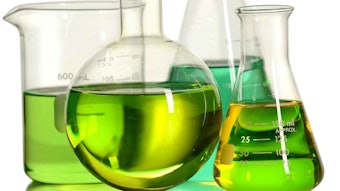Grant Industries has created a mercapto-containing dimethicone copolymer to improve adhesion to fiber surfaces in straightening, styling and anti-frizz applications. Gransil NYKT-P (INCI: Dimethicone/Mercaptopropyl Methicone Copolymer (and) Phenyl Trimethicone (and) Melaleuca (Tea Tree) Leaf Oil) can be formulated in at-home or salon smoothing treatments, where it functions as a hair shaft fixative, improving the internal architecture without causing damage.
Unlike other straightening treatments, the copolymer does not contain formaldehyde. In addition to the copolymer, the blend includes phenyl trimethicone for added shine and 2% tea tree oil to assist with the odor profile of the sulfur-containing polymer. The average polymer molecular weight is 2000–4000g/mol. The copolymer is recommended at 0.5-5% in shampoos, smoothing treatments, heat protection serums, rinse-off conditioners and leave-on conditioners. The copolymer allows hair to absorb less water, reducing drying and styling time. It also seals out humidity and protects hair from heat damage. To view the copolymer's effect on hair, watch Grant's demonstration video.
The company is also launching two silicone materials designed for enhanced sensory aesthetics in water-based applications. Gransil SiW-066 (INCI: Dimethicone (and) Polysilicone-11 (and) Butylene Glycol (and) Water (aqua) (and) Decyl Glucoside) is s/w microdispersion. The material's outer aqueous design allows it to be easily added to the water phase of formulations with no heat required. This feature makes it ideal for cold processing where elegant products can be created with simple mixing. It is recommended at 5-40% in skin care, color cosmetics, body care and sun care.
Gransil VX-409 (Bis-PEG-8 Dimethicone) offers 100% water-solubility in toners, light lotions, serums and wipe applications. It is an easy cold process addition for water-based formulations requiring a silicone feel. It is recommended at 1-10%.










